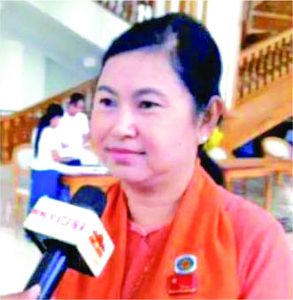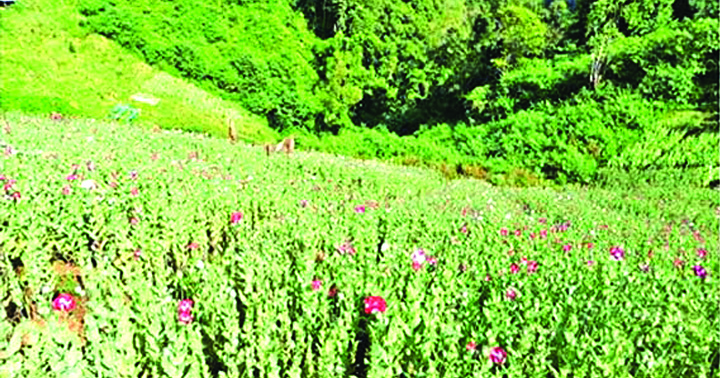6 June
To curb drug menace
Myanmar enacted the Narcotic Drugs and Psychotropic Substances Law in 1993 to replace the 1974 Narcotic and Dangerous Drug Law, and the drug eradication work has been carried out as a national duty across the county by cultivating substitute cash crops in place of poppies for many decades, but the drug menace is still there.

Reasons to grow poppy
A valley is a low area between hills or mountains typically with a river running through it, and they are surrounded by lush and green forests. At the end of February the valley was abloom with the white and velvet flowers of opium poppies.
They happened to be killers of human being and they are growing fast and rapid on the beautiful hills of Shan State and Kachin State.
Statistics showed that poppies are grown in 40 townships in Shan State; 6 townships in Kachin State; 3 townships in Kayin State; 2 townships in Chin State; a total of 51 townships with 3,00,000 households completely caring for the killer plants.
In Shan State, villagers are growing poppies as main source of income, and one in ten household is doing the job.
Daw Khin Hnin Thit of Pandaung constituency discussed that Myanmar is the second largest opium producer on this planet after Afghanistan, and it is pushing 14 percent of the world demand into the market. Ninety percent produce of the whole country comes from Shan State.
The lawmaker added that the poppies are growing profusely due to the reasons such as the area’s instability and insecurity, difficult road communication and poor rule of law, the low income of the local population and no other alternative for livelihood, the climate and surrounding environment that favors the growing of poppies, the low market values of the poppy substitute cash crops and the higher cost of cultivation for other crops. She also added that one fourth of the world production on opium comes from the golden triangle where Myanmar, Thailand and Laos meet according to the assessment.
According to Reuters news report a press brief was held in March 2019 in Thailand over the drug seizure. Thailand police shows to the media one of its largest crystal methamphetamine busts during a news conference in Bangkok, and indicated the drug volume has climbed up to ten times during two-year period and implied the drug supply was from Myanmar.
An expert on narcotics was of the view that the drugs from Myanmar entered into Thailand, and from there these small loads crossed Asia and Pacific Region arriving to New Zealand, which badly tarnishes the image of Myanmar.
The drugs changed into many hands starting from the grower, the producer, the peddler, and the user including the young ones in various secret methods, and that the trend is rising year by year in Myanmar.
Half of the inmates in the cells are the drug users and the majority is youth, and therefore the menace prompted the need to handle the matter effectively as the national duty. In an effort to rebalance the approach to drug challenges in Myanmar, the Government of Myanmar and UNODC announced a new National Drug Control Policy in February 2018.
The overall aim is to contribute to safe, secure and healthy communities including the development of nationalities through a policy that addresses all aspects of the drug problem, focusing on the unique needs of the country, in eradicating the poppy cultivation and uplift the lives of the cultivators.
Daw Khin Hnin Thit of Pandaung constituency added that the President of the country and the State Counsellor have already directed on the eradication of narcotic drugs. Moreover, the 71st Anniversary Independence Day National Objectives emphasized that to effectively combat and protect against the use of drugs and narcotic substances which can harm and erode the health and character of all citizens.
Furthermore, when the President took oath at the Pyidaungsu Hluttaw and at the New Year greetings speech, he urged for the suppression of narcotic drugs. At the International Day Against Drug Abuse and Illicit Trafficking event, the President told to solve the drug problems.
In January 2017, the State Counsellor issued a thank you message to the people where she mentioned that the future of the nation lies in the hands of the next generation youth, and therefore, they are to be nurtured in healthy surrounding with safe environment with strong spirit and good mentality to be ready to take charge of the country. It is therefore, the drugs problems are to be solved and the dark issue is to be erased.

Supporting viable alternatives
The president also announced the creation of the Special Anti-Drug Reporting Centre under his office to secure and reward drug informants. The centre has been equipped with phone numbers, fax number, and e-mail address that will ensure the protection of informers.
The drug cases could be reported to the Ministry of Home Affairs, the respective governments at the regional and state levels, an announcement issued to the public on 26 June 2018.
Out of the drug cases reported up to 1 June 2019, a total of 639 cases have been taken action, and those 840 males and 162 females, totaling 1002 persons have been arrested.
The seized drugs included many types of white opium, black opium, normal opium, and various narcotics drugs. The drug burst through the informants would be carried out in momentum the office of the President announced.
The experts on drug affairs are of the view in the same direction such as that of to reduce the cultivation of poppies; that of total eradication of poppy cultivation; that of in Thailand the poppy substitute crops are being grown resulting with the lesser production of poppies year by year; that of aid assistances being offered by UN agencies and foreign countries to grow substitute cash crops in place of poppies in 5 townships in Shan State; that of the need in providing business opportunities and other vocational careers to the poppy growers enabling them to stand on their own; that of the need to craft the national plans and the development programs.
The growing of poppies is the livelihood of the growers since their ancestors for many decades, and therefore, the cash received from poppy growing is the sole income of the family. They need assistance to stand on their own through other livelihoods.
Daw Khin Hnin Thit of Pandaung constituency added that cultivation of poppies is against the laws which tarnish the image of the nation creating great danger to the citizens. In order to eradicate the poppy cultivation, it needs to assist the livelihoods of the poppy cultivators with sustainable options. The challenges must be overcome with correct management and pragmatic changes.
Pandaung Township is located at the west bank of the mighty Ayeyarwady River, a small town in the Bago Region. The said township has vast areas of lands in Pyay District and in needs of basic requirements as the township has limited trading businesses with poor development.
It is therefore, Daw Khin Hnin Thit of Pandaung constituency is raising valuable questions to the Hluttaw on behalf of the local people by citing the regional development, the land grab issues, the compensation for railroads, the reimbursement of motor roads.
Moreover, she made some balancing motions at the Hluttaw on behalf of the people by urging for the successful exploration of oil and gas for the whole country, and also put up important questions relating to education, the health care, the socio-economic development, and the crime prevention issues of the country.
Regional development plans
Second Pyithu Hluttaw’s twelfth regular session was being convened in Nay Pyi Taw on 2 May 2019, and lawmaker Daw Khin Hnin Thit submitted a motion to the Hluttaw to invite entrepreneurs and business people to cooperate with the Union government to eradicate poppy cultivation in vast areas by substituting cash crops with sustainable regional development plans.
In strengthening her motion, Daw Khin Hnin Thit added her assessment by saying that the task in reducing the menace of drugs in Myanmar is not the issue of a particular region in the country; that the issuer involved neighboring countries as well as the countries in the region, linking up to the world; that Myanmar has signed relevant narcotic suppression agreements with countries in China – Mekong region as well as BIMSTEC countries; that Myanmar is cooperating with international community including UN agencies; that her motion needs to be approved for the sake of saving dignity of Myanmar in the midst of world nations.
The motion has been taken up and discussed by ten lawmakers from different point of views.
Daw Nann Than Than Lwin of Hpa-an Constituency in support of the proposal said that the poppy growing areas are in need of peace and rule of law; that the growers took up the poppy cultivation as they have no other alternative of legal livelihoods; that the situation needs to help assist the livelihoods of the poppy growers; that in September 2015 the UN General Assembly released the 2030 Agenda for Sustainable Development which contained 17 Sustainable Development Goals (SDGs), where Myanmar intended to make progress on globally important issues by the year 2030; that the nationalities in the remote areas must never be left behind; that poppy cultivation must be eradicated; and that the entrepreneurs and the business people must be invited to participate in this endeavor.
Deputy Minister Major General Than Htut of the Ministry of Border Affairs said that the government is fighting against the drug menace with its own strength as well as in cooperation with the neighboring countries; that the suppression of narcotic drugs is an ongoing task and it will be continued in the future; that the government have been fighting the drug menace in the past as well as in the present time and will continue in the future; that the task is a big challenge and the work program is vast and wide ranging; that the motion with regards to the participation of the business people in the drive against narcotic would help the local cultivators, and therefore, they are most welcomed; that the ministries at the union level, the governments at the regional and state levels are ready to participate in the campaign, and, therefore, the motion is being seconded for approval. Subsequently, the motion was approved at the Hluttaw.
Lawmaker Daw Khin Hnin Thit added that the task of the government and the business people over the substitution of cash crops in place of poppy would be beneficial to the local growers, that the “oolong tea” is being grown on 200 acres in substitutes of poppy which could be exported; and that the private business people are invited.
At the seventh-day meeting of the Second Pyithu Hluttaw’s 12th regular session held on 18 May 2019 Hluttaw approved a motion urging the government to invite public businesses to conduct crop-substitute programs for poppy farmers systematically in cooperation with the government under the Public-Private Partnership (PPP).
The approval of the motion is in line with the policy of the incumbent government giving priority to all the nationalities. It is therefore, the poppy substitution projects are to be implemented as national duties involving public businesses; and that the nationalities residing in the remote hilly regions are hopefully cooperate with understanding in order to transform the killing poisonous plants into lovely cash crops for the benefit of the local people and the entire people as a whole.
By Nanda Win
Translated by UMT (Ahlon)



